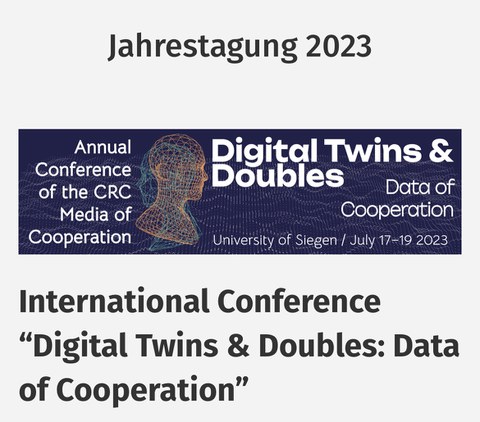Jul 17, 2023
Keynote Talk by Orit Halpern on 19.07.2023 at International Conference “Digital Twins & Doubles: Data of Cooperation”

Keynote Talk by Orit Halpern on 19.07.2023 at International Conference “Digital Twins & Doubles: Data of Cooperation”
International Conference
“Digital Twins & Doubles: Data of Cooperation”
@University of Siegen, July 17-19, 2023 (Obergraben 25, 57072 Siegen)
Keynote: Prof. Dr. Orit Halpern on Wednesday July 19 2023 (10:15-11:00)
The Planetary Test
In 1943 the architect Richard Neutra labelled a master plan for the re-structuring of Puerto Rico, “the Planetary Test”. It was not the first such tests at the time—shortly thereafter the Americans would first test the atomic bomb in the Nevada desert.
I want to take seriously what this means historically for architects (and perhaps scientists) to understand human habitation, entire cities and countries, and even the planets, as a “test-bed” and experimental site for the future of human life and habitation. In these practices planners envisioned constant feedback loops between the experiment or test (maybe simulation) and the real habitats of human beings. In Neutra’s formulation, produced not incidentally in a site of American colonial ambitions, the Global “South” was presented as a site in which to test through construction the future of design. In his formulation design would manage the futures of both geophysical forces and geopolitics, through “tests”, now to be conducted at the literal scale of an island.
A test, however, is not a simulation. The “planetary test” that has now become our habitat neither represents nor predicts stable set outcomes. Rather, the forms of testing—digital twining, stress testing in finance, scenario planning (and also DT) in supply chain design and insurance industries, complex dynamic systems modelling in ecology and meteorology, and demoing, rapid prototyping, and versioning in software development, architecture and urban design, are ways of inhabiting disastrous conditions and managing uncertainty without endpoint. They are technologies of time, capitalizing and turning into opportunities for arbitrage the uncertainties that exist between the many temporalities that co-exist in our world—those of biology, geology, chemistry, industry, and computation. No longer linked to calculable endpoints, we have now developed new modes of practice that defer representation of endpoints in the name of constant forms of derivation and speculation that manage time differentials and uncertainties through the constant feedback loop of data between virtual and “real” worlds.
This paper will speculatively track the relationship between contemporary conceptions of twining and histories of demos, test-beds, and social experiments at scale in planning, ecology, and computing to begin outlining some preliminary questions about what is at stake, and what futures are coming into being, with digital “twins”.
To check the fulll programme: https://www.mediacoop.uni-siegen.de/de/jahrestagung-2023/#Program
To register: Please send a short conference registration email by Sunday July 9 so that we can plan the logistics and catering accordingly:
Venue
Universität Siegen
Campus Unteres Schloss
US-S 001 / 002
Obergraben 25
57072 Siegen
